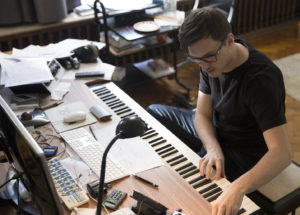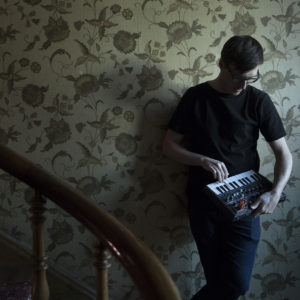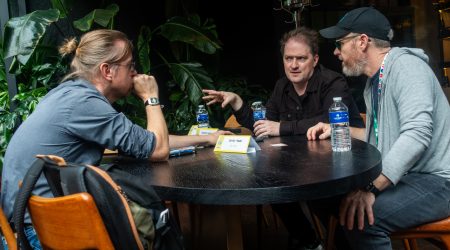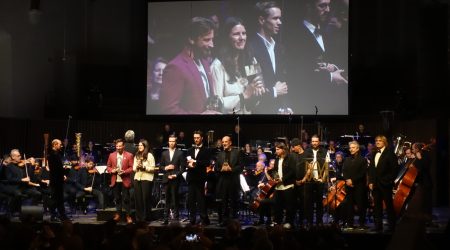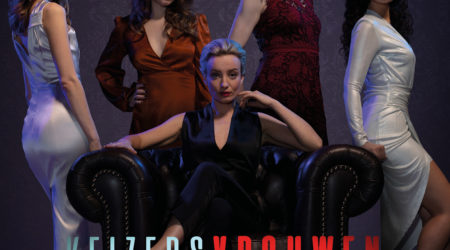Dutch/Flemish readers: This is a transcription of an interview that can also be watched as a video.
On October 24, 2020, the 20th World Soundtrack Awards were awarded. This was an online event, since it was not possible to host such a significant celebration on location with an audience during the pandemic. One of the award winners was Hannes de Maeyer who won the award for Best Original Score for a Belgian Production. I already knew about him and I have reviewed his music for Women of the Night. This time I had the pleasure of interviewing the Belgian composer via video chat to congratulate him on winning this award and to talk about his career.
Anton Smit: Hello Hannes. Congratulations on your WSA Award for the movie Torpedo: U-235. I noticed that this was not your first WSA Award, you also won one in 2005 for Best Young Belgian Composer.
Hannes de Maeyer: Thank you, that’s right. That was a while ago when I was still very inexperienced and young. Indeed, back then I won the composition competition at the movie festival. That was a super fantastic experience. It was actually my first time writing for an orchestra and then I immediately won with the movie at that time. They sent us a movie and we had to write music to it, and it was performed live by the Brussels Philharmonic, conducted by Dirk Brossé. That was very special. But that was for a composition contest, of course, and this year it’s a genuine prize, in a manner of speaking. It’s a real treat to win an actual World Soundtrack Award for Best Belgian Production.
AS: 2005 sounds like the beginning of your career, how did you get into this business?
HM: In 2005 I think I had just completed my first year at the conservatory. I think I was 19 years old. So I wasn’t really professional at all. I did have an interest in film music. But I didn’t really have much experience with scoring for movies.
AS: Where has your interest in film music come from?
HM: Actually, since I was a kid I have been interested in movies and film music, especially Disney movies, The Little Mermaid, Beauty and the Beast and Aladdin for example, all those Alan Menken scores when I didn’t know who Alan Menken was. I was fascinated by them, and I sang those songs all the time. Additionally, I was playing the piano at the music school at the time and I played a lot of music. But I think that when The Lord of the Rings came out, that was the next phase in my brain of what the music did and how beautiful it was. It has grown steadily, but I think that movie made me realize that one day I could do what would make me the happiest person in the world. I even did my final thesis in my final year in high school in Belgium about the music of The Lord of the Rings. I discussed all the themes and the orchestration, so I went for an in-depth analysis. That was way over the head of my teacher: It was way too in-depth for him, so I received a lot of good points from him.
When I studied at the conservatory, I did a few short films. When I was in my final year I did music production as well. That’s both the production aspect and usually creating songs, but I was interested in film music, so I focused on that. I followed composition, orchestration and conducting. When I was in my final year I wanted to do something with film music as a graduation project while also adding real instruments to samples to make them seem bigger and more realistic. That was the idea behind it. I contacted the RITCS film school in Brussels. I had contacted two people who were studying there and for those two, I did the short movies. One of them is Hendrik Verthé and when he graduated he didn’t actually do any directing but together with Kobe Van Steenberghe he set up a production company A Team Productions. Since that time I’ve been collaborating with them a lot. They’ve also had a fantastic career trajectory, and among other things, Torpedo was my latest movie with them. Of course, when you are doing several projects, you also get in touch with other people. I think getting in touch with the film school was the planting phase of the seed. From there everything else has grown.
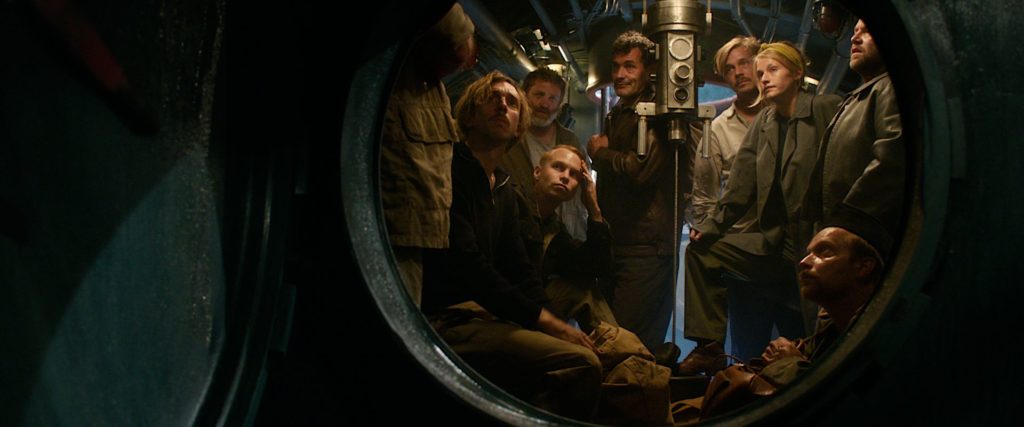
AS: You mentioned Torpedo. I have seen this movie about a group of Flemish resistance fighters in the Second World War who suddenly had to operate a submarine. There are probably many people who have not seen this film and have not heard the music. Can you elaborate on the music you wrote for it?
HM: The movie is set during the Second World War, which is an important thing to keep in mind, and director Sven Huybrechts wanted to reflect, with the movie but also with the music, the nostalgic character of the great war movies such as Saving Private Ryan or The Magnificent Seven. We are talking about a lot of brass, snare drums and strings. On the one hand, there was the adventure and on the other, there was the challenge for this movie not to go too old-fashioned, which was mainly a fear of the producers. That was a bit of walking the tightrope between the two.
AS: What do you mean exactly by old-fashioned music?
HM: As far as I’m concerned, when I hear all these references to older movies, I find that super awesome and nostalgic. But to the ears of the producers, it shouldn’t sound like, for example, the famous main title by Elmer Bernstein from The Great Escape. Those influences are in the score now as well, but not too cheerful. I’ve tried to make it sound a bit more modern, but of course, that also happens with the mixing, choice of notes and there are some subtle synths in it, but not much, it’s all mainly acoustic.
AS: When I listen to your music, Torpedo is indeed orchestral with additional instruments. But I have also listened to your other compositions which are very synthesizer-like: almost completely electronic. I have also heard music that is a mixture of both styles. What is your train of thought for the use of one of the two styles? What makes you decide to go for a certain style?
HM: Usually it is slightly dictated by the movie, and it also requires consultation with the director about what is needed. I did Gangsta directed by Adil El Arbi and Bilall Fallah for example. If the music for Gangsta sounded like Torpedo that would make no sense whatsoever. It wouldn’t really match the style of the movie. I do like to combine the two worlds and that can be very subtle, but it can also be very obvious. Or sometimes predominantly electronic and then a few acoustic instruments, just some strings or orchestra. But yes, most of the time it is dictated by the movie.
AS: But is that dictated by production or director? Or does it happen in your head?
HM: A combination of both I think. First of all, mainly the movie, how it’s shot, the atmosphere it evokes. Sometimes I think it will not fit if I go purely non-electronic. I think I can tell quickly. The director and the producer have a big say, of course. Making a movie is about working together, it is not everyone on their own. Together you will achieve a certain outcome or a decision for a certain musical genre.
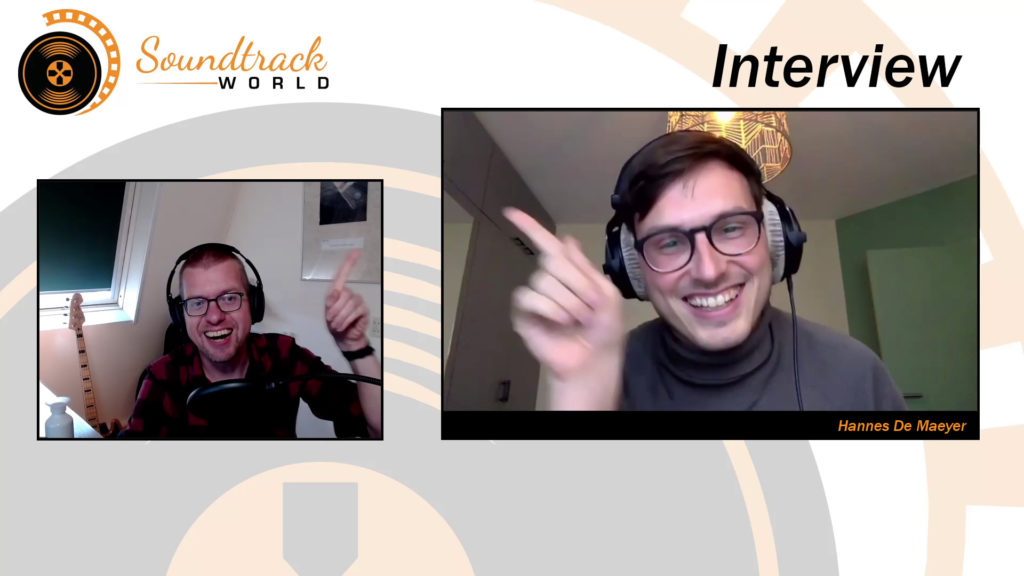
AS: It is now the year 2020. What is it like to be a film music composer in Belgium during this COVID-19 period?
HM: Of course it’s a peculiar time for everyone, now that we live with COVID. I’m relatively lucky to be able to continue working for the time being. I think that in March, April and maybe even May I had fallen into a void of almost no work, but then it quietly started to pick up again. On the one hand, I am now working on an animated series, together with a colleague of mine, Gregory Caron, with whom I also did Professor T. An animated series means that there are no sets where you have to film, with real people and COVID measures. Drawing is done on computers, so that project in itself has not been hit that hard. There isn’t much live recording done for it either. In television, everything has to be fast and especially in animation. We don’t have any problems with that either, that we can’t record the strings.
I am also working on the preproduction of Rebel of El Arbi and Fallah. There was always the question, for example, whether the shoot would take place in October, which is now, or next year. The problem for the composers will rather be shifted a bit, moved to a later date. It depends on when the movies can be filmed. If the shoot can’t go ahead, that means that the project will be postponed or canceled. Hopefully not, but that means that the time I have to compose will come at a later date. But suppose a lot gets postponed or canceled, it means that the hole in my calendar will be shifted to somewhere in the future. So I think that for now, as far as I am concerned, it is the uncertainty of whether projects will go ahead or not. Everyone is, of course, waiting for the moment when we can safely film again. The problem may then be that different projects that used to fit nicely in the agenda, or just subtly overlap, may all clash. As a result, it might not be possible to combine things.
But apart from that scheduling problem, whether it is due to the pandemic or not, I’m actually always in ‘lockdown’, so to speak. I’m just sitting here creating music behind my computer and my piano. Fortunately, I can keep working. My colleagues and friends, who are musicians and only play live, they are off much worse than me. I am very grateful that I can continue to work.
AS: You said that you are in lockdown, but you also collaborate with people, like Women of the Night with Eloi Ragot. What is it like to work with people instead of just working on a project by yourself?
HM: I find that very interesting. I find it very cool to do, because everyone has a different background and has different strengths and weaknesses and different ways of tackling things. I find it very enriching to collaborate with other composers. It also helps that there are two of you to carry the burden. Imagine if you are stuck or you want a second opinion, then you send it to each other and you might get ideas from the other. Women of the Night for example with Eloi. I’m a pianist, which is my main instrument, but he is a guitarist. Those are already two different approaches, which you can merge together nicely. Ideas that overlap. I start working on a cue and he gets to continue with it. He adds something, for example, or he reworks my theme. That is very nice. Gregory Caron, for example, with whom I am now working on that animated series, and before that Professor T, is someone with a lot of taste and a good sense for music, but he doesn’t have a musical education. He can’t distinguish a ‘do’ from a ‘re’ on paper. So that is another interesting collaboration, because he approaches the music differently than I do. Sometimes very interesting and surprising results come out of that, which is nice.
AS: So final question, we are going to hear more from you in the near future?
HM: Let’s hope so! I hope I can continue doing this for a long time. For me this really is a dream job.
AS: So maybe there will be some more awards to add to the long list you already have!
HM: Fingers crossed! That would be really nice. It is not self-evident. But of course, it is always fun to get recognition.
AS: Just keep working for it!
HM: Voila, that is how it is.

